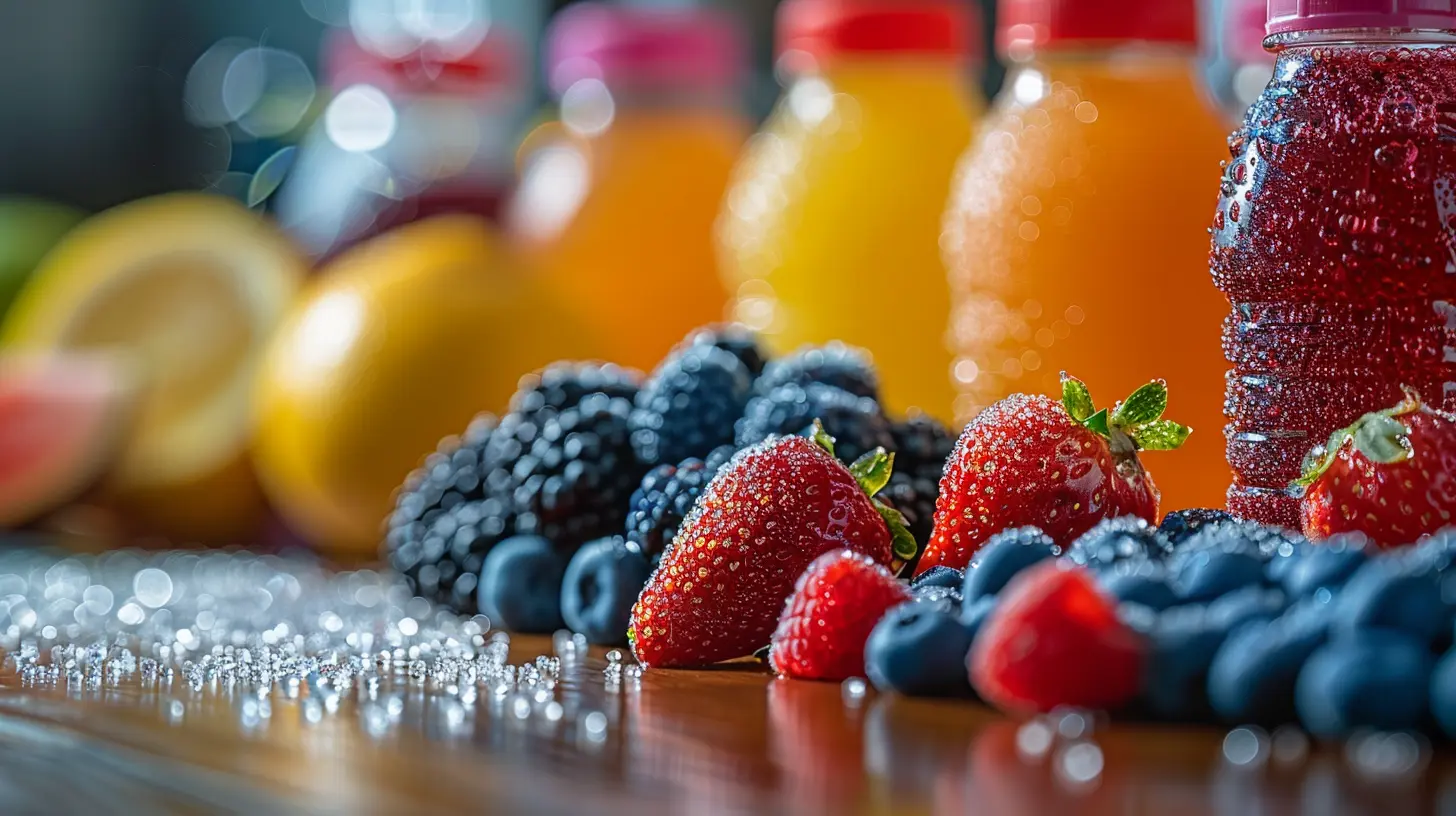Boosting Your Athletic Performance with a Sugar-Free Diet
22 May 2025
Are you looking to take your athletic performance to the next level? What if I told you that cutting out sugar could be the game-changer you need? It might sound extreme, but trust me, ditching sugar can do wonders for your endurance, recovery, and overall fitness.
Athletes often focus on training, supplements, and protein intake, but one of the most overlooked aspects of performance is diet—specifically, sugar consumption. Let’s dive into how going sugar-free can supercharge your energy levels, improve recovery, and enhance your athletic abilities like never before.

Why Sugar is a Hidden Enemy for Athletes
Sugar seems harmless, right? After all, it’s in almost everything—sports drinks, protein bars, and even foods marketed as "healthy." But here’s the catch: consuming too much sugar can sabotage your progress.1. Energy Spikes and Crashes
Sure, sugar gives you a quick energy boost, but what happens afterward? You crash. Hard. Imagine running a marathon with a rocket strapped to your back—it’ll be thrilling for a few minutes, but once the fuel burns out, you're left crawling.2. Inflammation and Recovery Issues
Excess sugar leads to inflammation, which slows down recovery. Have you ever felt sore for days after a workout? Your sugar intake might be the culprit. Inflammation stiffens muscles, prolongs recovery, and increases the likelihood of injuries.3. Poor Endurance and Stamina
Sugar doesn’t provide sustained energy. Unlike healthy fats and complex carbohydrates, sugar burns fast and leaves you drained. Athletes need consistent, long-lasting fuel—not quick fixes.
The Benefits of a Sugar-Free Diet for Athletes
Now that we’ve exposed sugar’s dark side, let’s focus on why eliminating it can elevate your athletic performance.1. Stable Energy Levels
When you ditch sugar, your body learns to rely on healthier sources of energy like fats and complex carbs. This leads to steady, long-lasting stamina—whether you're lifting weights, running marathons, or crushing it in the gym. No more sudden energy crashes!2. Better Recovery and Reduced Inflammation
Less sugar means less inflammation, and less inflammation means quicker recovery. Your muscles heal faster, soreness decreases, and you’re ready to train harder and more frequently. Who wouldn’t want that?3. Improved Mental Focus and Clarity
Athletic performance isn’t just physical—it’s mental too. Sugar messes with your brain, causing fogginess and sluggishness. Cutting it out sharpens your focus, enhances decision-making, and keeps you mentally strong during competitions.4. Better Digestion and Gut Health
Excess sugar disrupts gut health by feeding bad bacteria. A healthy gut improves nutrient absorption, ensuring you get the most out of your diet. More nutrients = better performance.5. Increased Fat Burning
When you reduce sugar intake, your body shifts to burning fat for energy instead of relying on glucose. This process, known as fat adaptation, helps improve endurance and stamina. It’s like upgrading from gas to an electric car—efficient and long-lasting!
How to Transition to a Sugar-Free Diet
Cutting out sugar doesn’t mean you have to eat bland food or starve yourself. Here’s a step-by-step guide to making the transition smooth and sustainable.1. Identify Hidden Sugars
Sugar hides in places you wouldn’t expect—salad dressings, sauces, flavored yogurts, and even so-called "health" foods. Read labels carefully and avoid anything with added sugars, high fructose corn syrup, or artificial sweeteners.2. Choose Natural Sweeteners
If you have a sweet tooth, don’t panic! Swap refined sugar for natural options like honey, dates, or monk fruit. These alternatives provide a sweet taste without spiking your blood sugar.3. Eat More Healthy Fats and Proteins
Healthy fats (avocados, nuts, seeds, olive oil) and proteins (chicken, fish, eggs, tofu) keep you full, reduce cravings, and provide long-lasting energy.4. Opt for Slow-Digesting Carbs
Not all carbs are bad! Focus on complex carbohydrates like sweet potatoes, quinoa, brown rice, and legumes. They provide steady energy without the sugar crash.5. Stay Hydrated with the Right Drinks
Ditch sugary sports drinks and opt for water, coconut water, or homemade electrolyte drinks. Hydration is key for peak performance, and you don’t need sugar to stay hydrated.6. Plan Your Meals and Snacks
Meal prepping helps you avoid last-minute temptations. Pack sugar-free snacks like nuts, boiled eggs, hummus with veggies, or homemade protein bars.7. Listen to Your Body
Your body will need time to adjust, so be patient. The first week might be challenging as you battle cravings, but once you push through, you’ll feel a new level of energy and endurance.
Common Myths About Going Sugar-Free
When you tell people you’re cutting out sugar, you’ll probably hear some myths. Let’s bust a few of them.Myth 1: ‘You Need Sugar for Energy’
No, you need fuel—and that can come from fats and complex carbs, not sugar. Your body actually performs better when it runs on steady energy sources rather than sugar spikes.Myth 2: ‘Going Sugar-Free Means No Carbs’
Cutting sugar doesn’t mean eliminating carbs. It’s about choosing the right ones—whole, unprocessed, and nutrient-dense.Myth 3: ‘You Won’t Have Any Sweet Treats’
Plenty of sugar-free dessert options exist! Dark chocolate, fruit-based treats, and homemade protein snacks can satisfy your cravings without the harmful effects of refined sugar.Real-Life Success Stories
Many athletes have switched to a sugar-free diet and seen remarkable changes. For example:- LeBron James reportedly followed a strict sugar-free diet and experienced increased endurance and better performance.
- Novak Djokovic credits his success to a clean diet without processed sugars, helping improve his focus and stamina.
These top athletes prove that cutting sugar isn’t a setback—it’s an upgrade.
Final Thoughts
Eliminating sugar might seem difficult at first, but the benefits far outweigh the challenges. More energy, faster recovery, better focus, and improved endurance—what’s not to love?If you’re serious about boosting your athletic performance, it’s time to take control of your diet. Start small, stay consistent, and watch your body transform into a performance powerhouse.
So, are you ready to ditch sugar and unleash your full athletic potential?
all images in this post were generated using AI tools
Category:
Sugar FreeAuthor:

Eileen Wood
Discussion
rate this article
3 comments
Sonya Nelson
Oh, sure! Because nothing says “champion” like munching on kale chips while your friends devour cake. Who needs sugar for energy when you can just embrace the sweet, sweet taste of regret? Clearly, a sugar-free diet is the ultimate sports secret! 🍏🏃♂️
May 31, 2025 at 2:30 AM

Eileen Wood
While it may seem tough, a sugar-free diet can enhance endurance and recovery, allowing athletes to perform at their best—no regrets, just results! 🍏💪
Indie McGehee
A sugar-free diet can enhance athletic performance by stabilizing energy levels and improving recovery. Focusing on whole foods rich in nutrients helps maintain endurance and strength. Embrace healthy alternatives to fuel your workouts for optimal results and overall well-being.
May 27, 2025 at 2:42 AM

Eileen Wood
Thank you for your insightful comment! I completely agree—focusing on whole foods and healthy alternatives is key to enhancing athletic performance and recovery.
Aris Gilbert
Sugar-free? Yes, please! Ditch the sweet stuff and watch your energy levels soar. You’ve got goals to crush! If you think you can’t perform without sugar, you’re just feeding excuses. Time to fuel like the champion you are—sassy and strong without the sugar crash!
May 26, 2025 at 4:10 PM

Eileen Wood
Thanks for the enthusiastic support! Embracing a sugar-free diet truly can elevate performance and energy. Let’s crush those goals together!



